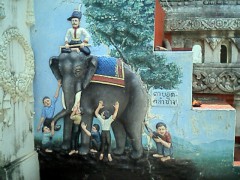Redefining Success: the Story of the Blind Men and the Elephant

This post was produced for the Global Economic Symposium 2013. Read more at http://blog.global-economic-symposium.org/.
What is success? Why redefine it?
What’s the deal with “sustainability”? Why is it important?
If you attended the recently concluded Global Economic Symposium (GES 2013), you would have heard at least a dozen different perspectives on these questions. For some, success is in getting people to better understand the world of banking and finance (because “financial illiteracy is the new slavery” according to John Hope Bryant). For some others, success is in seeing a world where women are truly given their due share and have the freedom and the means to contribute to the world. For others, it is still in gross domestic product and for still others, in gross national happiness. Essentially, the symposium helped the attendees — many of them leading (grey-haired) movers and shakers on the world’s stage of economics, politics, and business — to think and reflect on what is truly important. The effort was to get people to acknowledge the complex world we live in and what it will take to make it a better place.
The GES was as much a philosophical symposium as an economic one. People traded ideas about the world they want to live in. In the trading of these ideas, people got to know the world a little more richly. In a way, we are still the blind men in the story of the blind men and the elephant. We look at the world and see the missing piece. We feel that “if only this changes, the world would be a better place.” Like in the story of the blind men, we see only a part of the greater world. It’s human nature to want what one is deficient in. And in my opinion, we are only truly aware of what we lack and want and not, unfortunately, of what we have and hence do not want (but is still important to us). We are blinded by our wants. We cannot progress until we see beyond and beneath them.
With efforts like GES, the blind men get to talk to each other. A better world can only be realized if we talk and cooperate in realizing each other’s dreams.
The conversation at GES was progressive in the context of the current world, which for the larger part of its recent history had only seen success in self-interest and accumulation of wealth (largely through extractive means). GES is facilitating and channeling the thoughts and ideas of many to enable us to see a truer view of the world. This truer view is essential if we want to ensure the future. The question is not merely of ecology or commerce. It is about survival and change, freedom and order, old and new.
At the end of the day, everything boils down to basic human values — compassion, respect, optimism, leadership, trust, good faith. If we get it right, we are only going to prosper — economically, emotionally, and ecologically.
Tags: economics, ges2013, Global Economic Symposium, indian story, philosophy, Story, success, sustainability

